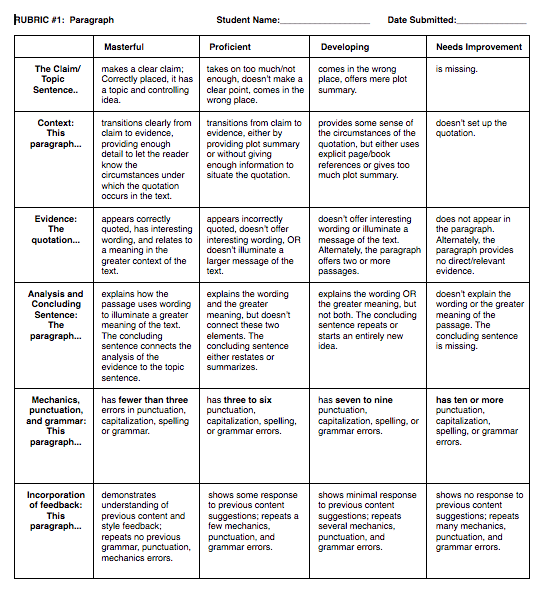
You may notice that I put a much larger photo on this week's post than I usually do. (Of course, that assumes you've ever looked at the website before...which Google Analytics tell me you haven't, but I'm an optimist, so I'm writing to thousands of future website visitors.) I enlarged the photo so that you can actually read the words on the rubric I wrote to grade students' paragraphs. (What do you think? Any advice for me?)
The truth is that I'm pretty new to grading with rubrics. Before last year, I almost never used them to assess student work. I used to think that holding an essay up to a rubric was a way to avoid having to do difficult evaluative work, but the facts were that (1) students didn't always know exactly what I expected and (2) I had to write the same kinds of comments over and over on student essays. What a waste of everyone's time!
Last year, I decided to try to spell out the elements of a good essay. I created simple rubrics that said what writing elements could earn a perfect score in each category. Then, when grading with the rubrics, I had to decide how close to a perfect score each essay was. I realized that a rubric needs to clarify what's NOT perfect work as well.
Last year, I had rubrics with point values noted for each category. This year, I've taken the points off of all of my rubrics and explained what qualifies as "masterful," "strong" "fair" and "need improvement" for each category I assess. Further, I've added a category on every rubric (paragraphs, analytical essays, SQUIDs, and creative essays) that evaluates the student's application of past feedback. I'm excited to see if that row gets my students to look through returned work to find errors for which they should edit the current piece. I'm hoping that in May, my students' aren't repeating errors they made in October. (Fingers crossed!)
Having a rubric is helpful to the teacher AND to the students.
For students, a rubric
- explains the aims of the assignment
- delineates what topics need to be covered
- clarifies the best approaches to covering those topics
- provides a straightforward explanation of the teacher's assessment of the work and useful feedback
For teachers, a rubric
- focuses the assignment on key elements
- forces equitable grading practices
- provides useful feedback to students
- saves time (don't have to spell out the same feedback for multiple students)
What do you think about rubrics?